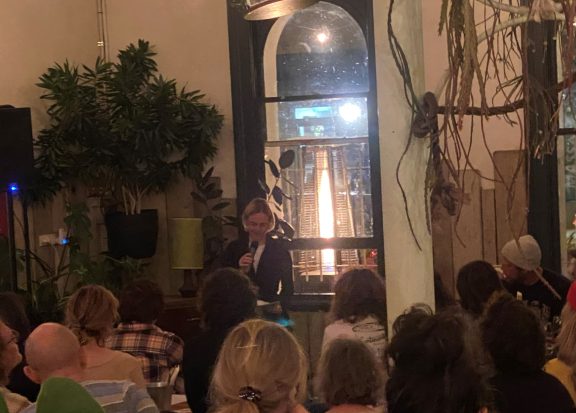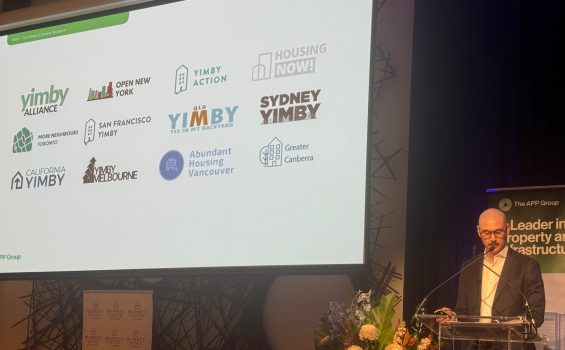
Guest Post: Filling Vacant Buildings Challenges and Successes in Freo and Beyond
31 August 2022
Sarah Booth gave this wonderful talk at Politics in the Pub on Tuesday night. It deserves to be widely read so I convinced her to let me share it on my blog. She delivered this to a packed room at The Local Hotel in South Fremantle as part of a broader discussion on how can Fremantle fills its empty shop fronts and other buildings.
—–
Hi, my name is Sarah Booth and I manage a small business called Spacemarket with architect Nic Brunsdon and formerly with Kate Hulett of Kate & Abel. We operate mainly in Freo, but have recently expanded our operations to the East End of the Perth CBD – and what we do is identify vacant and underused buildings and try to fill them with interesting businesses. The types of businesses that make a good city great, the types of businesses that might make you want to visit a place and stroll around (and stay for dinner and bring your friends) – our tenants are bakers, galleries, artists, theatre companies, record stores, musicians, cooks, VR, clothes makers and woodworkers. Our aim is to fill city centers with LIFE and it’s a lot harder than it sounds – though it shouldn’t be.
Because we have lots of people who want to base themselves in Freo; Spacemarket receive a steady stream of emails from arts organisations, unique retailers, First Nations start-ups, educators, architects, hospitality groups and emerging tech companies – all who would love to find their place in our vibrant little port city – and their biggest deterrent, every time, is lack of affordable space.
With one fifth of our CBD currently sitting vacant it might make you wonder why the supply wouldn’t adjust itself to meet this demand? I, like most people, used to think of these vacant spaces; “Surely some money is better than none?” – that’s when I started approaching the owners of vacant spaces and I got a greater understanding of what’s at play.
This problem is not unique to Fremantle, in fact you’ll see it happening everywhere from CBDs to regional towns all over Australia. What we’re seeing isn’t a problem to be solved with reason or innovative ideas – though ideas like Ros’s wonderful Street Gallery sure help us as at a community level – what we’re seeing is the effect of unchecked free market Capitalism, it’s the burden of an inflexible and hamstrung bureaucracy, a tax system that not only favors but incentivises high net worth individuals to do exactly what they’re doing on our high streets, allowing them to write off property losses and for banks to allow borrowing against long ago rental returns, and at the end of the day the system has no mechanisms, or even appetite for mechanisms, to combat it… SO. Rates and vacancies. What can I say. Spacemarket fully support a rate rise on vacant commercial properties. Is that the solution to this problem? No, but it’s a start. The best possible result of this rate rise, that we can hope for as a community, is that it encourages current problem landlords to sell their long vacant properties. Hopefully to someone who at the very least would like to do something with them. And though we’re starting to see a bit of property movement, it’s not something our City should be holding out hoping might happen.
We believe, and this will never happen, that the State Government need to intervene with legislation that says if you own, inherit or buy property within a CBD you have a legal obligation to do something with it within 12 months. You can try for one year to rent it at this alleged “market rent” (but, I mean, is it really a market if no one wants what you’re selling?) and then it must be put to the actual market so our high streets have a hope of re-establishing themselves. Because when shops are full – people have something to come for. When lights are on, windows washed and spaces cared for they stop becoming urinals and rubbish bins. When the street is alive, spaces become safer, and we’re able to better care for people doing it tough. Property prices increase naturally and in the end its the property owners who will mostly benefit anyway!
Because sitting on a property, that fronts the streets of our city, that can be left not just vacant but filthy, that because of its vacancy can affect the local economy of our city, can affect the success of other local business owners, can affect the morale of its residents, its tourism and its reputation and perception out in the world, that by its very presence can exacerbate existing social problems and amplify others, and worst of all that there’s also not one mechanism at our disposal as a community to effect this all taking place, tells me the problem we are fighting is not one we, or the City alone have a chance at overcoming. There has to be a want of everyone involved, and that includes property owners.
And the frustrating thing is that I know it’s possible to fill these vacant spaces. While we understand property owners desire a return on their asset, very few of these long-term vacant properties have mortgages, in fact many of these currently sitting vacant in Fremantle were likely paid off last century, are part of sprawling portfolios of property, and have values far beyond what they were originally purchased for. They could be rented for outgoings alone, at little impact to the owner or to the sale value of the property.
I know it’s possible because were doing it – Adrian Fini & Nic Tromboli of Bread in Common Group bought the vacant Robert Harper building on Phillimore Street and handed us the keys until they know what to do with it, we now have 40 small businesses, arts organisations and creative professional tenants working from this space including Fremantle Biennale, Plastic Free July, Nic Brunsdon Architects, artist Sara Drake, and Shelter Brewing – all paying rent they can afford – and Adrian and Nic have all outgoings and building maintenance covered by that rent. Jim Litis and Prime West gave us our Essex Street property 18 months ago at an affordable rent, we completely refurbished it for them at our own cost and now have 25 tenants working from there. Defense Housing gave us 9 retail tenancies 4 years ago on Queen Victoria Street and we filled all 9 in two weeks. When City of Freo handed us the keys to the completely stripped out and neglected Victoria Hall, we again refurbished the asset at our own cost, and had a Hollywood actress performing on stage within 6 months – our tenant, Fremantle Theatre Company – took over the lease and just wrapped their fourth successful theatre production in the space. There are many spaces sitting amongst us with potential such as these – not just held by problem owners – but some owned by our favourite local billionaire, some by Notre Dame, some by the State Government – all sitting unused.
To be honest, I don’t really know what to do about what’s happening in Fremantle. There are other conversations to be had about rates – and who does and doesn’t pay their share – about how rate increases might affect unintended recipients, about how to manage gentrification, about increasing our resident population, and about the social and housing challenges facing our cities. But for now, Spacemarket, simply, naively (?) just want lights on, windows clean and bright ideas and businesses to get a chance here. For now, we believe our community and Fremantle depend on it.


Really enlightening from someone so experienced Sarah. I’m discouraged, enraged but faintly optimistic that voices will be heard on this important issue.
Jocelyn, that is the same feeling I had. But hopefully Sarah’s work help shift the dial on this.
Thanks Sarah for shedding some light on this thorny problem. If the issue needs state government intervention to make ‘absentee’ landlords rent out or sell their vacant properties, then how about it Simone McGurk and Mark McGowan?
Great article Sarah.
A lot of the issues and costs associated with recycling buildings relate to the extent of upgrade required when repurposing to a changed use profile, such as warehouse to retail. The process involves people like ourselves (Building Surveyors) making judgement calls on the extent of work required to bring buildings up to and acceptable standard for people today, referecing the “CODE” of the day. Without clear directionn on this, uncertainty in the feasibilty stage of design, committment to leases or the split between landlord and tenant works can be a deterrent. The bottom line is that buildings are for people and this is a reasonable baseline to start from, working together with Asset owners, developers, architects and businesses from the early stage to maintain and ehance the existing building fabric and contribute something special whilst ensuring buildig are safe, accessible and sustainable is the balancing act. Working together on these projects from the early stages creates certainty, more accurtate feasibilty which can reduce grey areas and contribute positively to a project. Understand it is only one part of the problem and it doesn’t address the tax offset problem. Once there is a decision to improve a building, we can help.
Gary